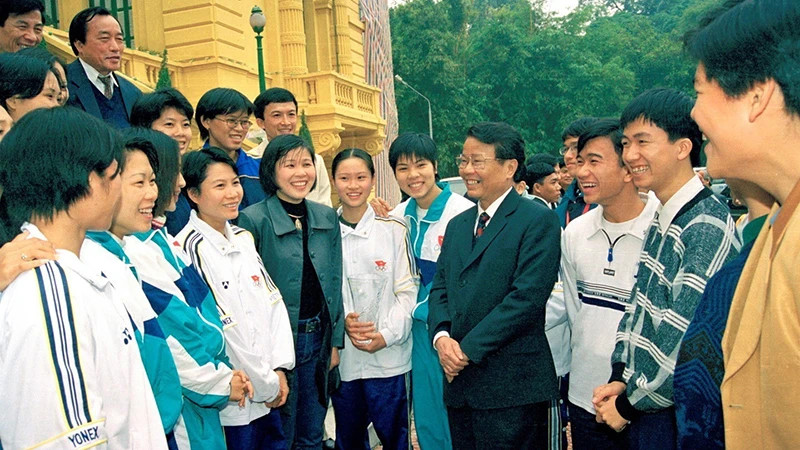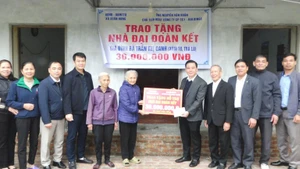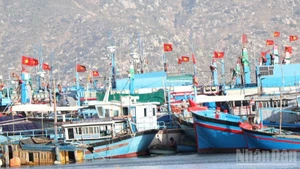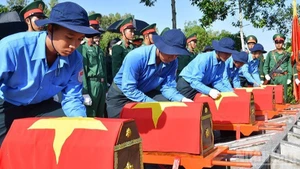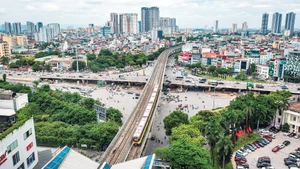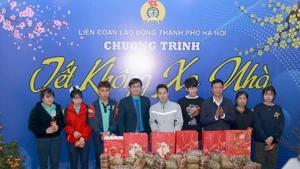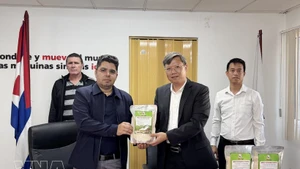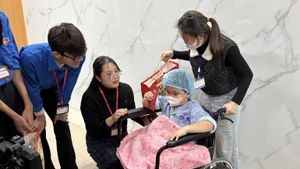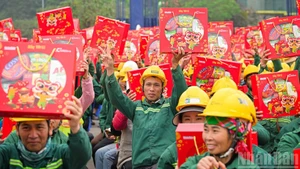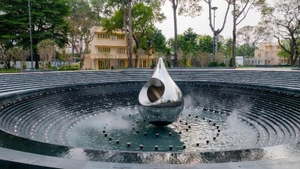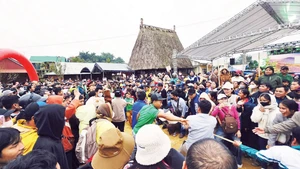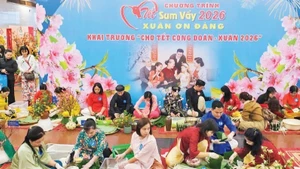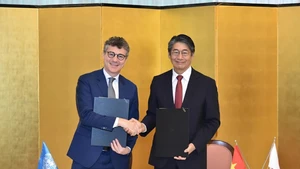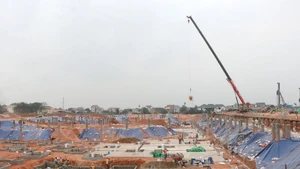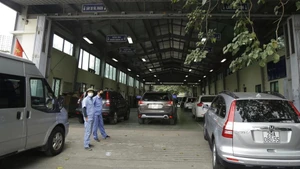To me, it is the loss of an elder brother, a comrade with whom I shared decades of revolutionary work.
Tran Duc Luong belonged to the first generation of intellectuals trained and nurtured by the Party. From a geology engineer, he rose through the revolutionary ranks, ultimately joining the nation's top leadership by virtue of his talent, integrity, and steadfastness.
In my memory, he was a man of modesty and depth — strict yet gentle, a sharp thinker, a resolute leader, and a serious-minded intellectual.
In my memory, he was a man of modesty and depth — strict yet gentle, a sharp thinker, a resolute leader, and a serious-minded intellectual.
During my tenure as secretary of the Song Be Provincial Party Committee, the region faced severe hardships. In response to the people’s pressing needs, the provincial leadership proposed allocating fallow and poor forest land to locals for cultivation.
Though initially met with hesitation at the central level, Tran Duc Luong and Nguyen Cong Tan, then deputy prime ministers, were repeatedly sent by the prime minister to Song Be to observe and reach consensus.
They represented the government in removing policy barriers, enabling thousands of households to receive land, stabilise their livelihoods, and lay the groundwork for socio-economic development. Their support was not merely administrative but reflected a deep understanding of grassroots realities and a genuine concern for the people.
Also, in Song Be, troubled by the persistent poverty of a region that had sacrificed so much during the war, the local leadership initiated the then-novel concept of centralised industrial parks. Under the close guidance of Deputy Prime Minister Tran Duc Luong, all bottlenecks were resolved and these parks began to take shape, paving the way for Binh Duong to become a major industrial hub of the country — evidence of his strategic vision and commitment to national development.
Later, as I assumed the role of secretary of Ho Chi Minh City Party Committee, Tran Duc Luong, then President, frequently visited and offered pragmatic and forward-thinking guidance. The establishment of the city’s High-Tech Park — a groundbreaking idea at the time — benefited greatly from his strong support. It was the backing of a scientist-turned-statesman: intellectually profound, and bold in thought and action.
In 2005, during the 30th anniversary of the liberation of the South and national reunification, Ho Chi Minh City was honoured with the title “Heroic City of the Renewal Era” by the Party and state. I had the privilege of working closely with President Luong in meticulous and responsible preparations for this grand occasion. The proud smiles of the city’s people from that day remain vivid in my mind.
President Tran Duc Luong held office during a pivotal phase of Viet Nam’s transformation — accelerating international integration and asserting its global standing. He embodied a renewed, peaceful, cooperative, and progressive Viet Nam. He played a crucial role in advancing ASEAN membership as well as preparing for and witnessing Viet Nam’s accession to the World Trade Organisation.
His contributions elevated Viet Nam’s international profile through numerous high-level visits and diplomatic engagements. His calm demeanour, firm yet flexible thinking left a strong impression on foreign counterparts, reinforcing the image of a responsible and modern Viet Nam.
At the 1997 Francophone Summit in Ha Noi — the first such summit hosted by an Asian nation — President Luong delivered his opening speech in French. His command of the language surprised many of the 35 attending heads of state and marked a significant diplomatic moment, underscoring Viet Nam’s commitment to multilateral cooperation and its high-level diplomatic prowess.
French President Jacques Chirac, who was in attendance, praised Viet Nam as a symbol of integration.
Many recall the historic 2000 visit of US President Bill Clinton — the first sitting US president to visit Viet Nam post-war. This visit broke the ice in US-Viet Nam relations and signalled the start of comprehensive normalisation.
President Clinton expressed deep admiration for Viet Nam’s reform progress and for President Luong’s calm and steadfast leadership. Such leadership during pivotal moments helped raise Viet Nam’s international stature during its integration period.
One might say that the achievements in foreign affairs during Tran Duc Luong’s presidency were like a river being charted — one which his successors would later navigate while steering Viet Nam into the global arena.
As president, he placed great emphasis on national unity, promoting democracy while ensuring discipline, and building a socialist rule-of-law state.
When the Politburo established the Steering Committee for Judicial Reform, he was appointed its head. He drove the implementation of Politburo Resolution 08 on judicial reform, strengthening law enforcement institutions and elevating the legal system in response to Party and public expectations.
Five years into the reform, notable changes emerged: greater attention to judicial work, stronger legal institutions, and a growing public awareness of the rule of law. Legal education took root and became institutionalised.
He also made meaningful contributions to emulation and commendation policies, amnesty procedures, and other initiatives reflecting profound humanitarian values. He often emphasised: Emulation must be genuine, commendation must be fair, and amnesty must offer a real chance at redemption for those who truly repent.
As the ceremonial head of state, the president symbolises the nation — exemplifying integrity, modesty, and closeness to the people. Tran Duc Luong was such a symbol, admired by both the Vietnamese public and international friends. Those who worked with him remember a leader of stature, an intellectual of high calibre, and a model of simplicity and purity.
Although he has passed on — quietly, as he lived — he leaves behind deep sorrow among comrades and citizens, and the respect of global partners. His legacy, both in service and character, will remain a shining example of revolutionary virtue, a quiet yet enduring flame that will continue to inspire future generations in service of the nation and its people.
